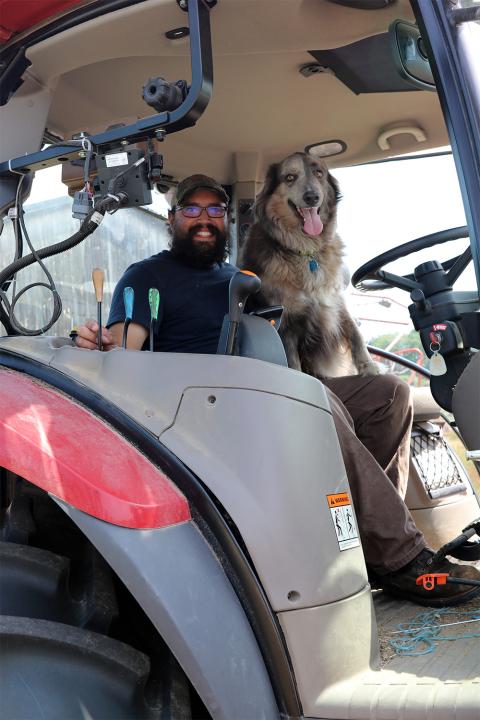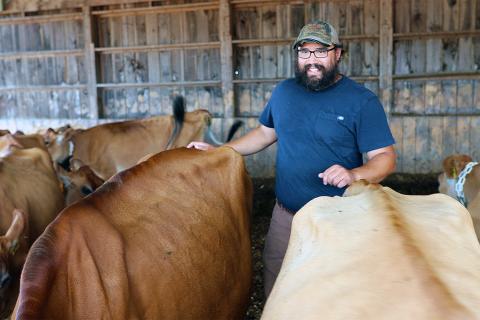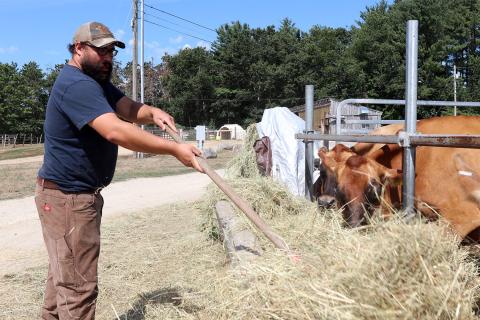
Isagani Kimball, assistant farm manager of the Organic Dairy Research Farm (ODRF), started farming in his hometown of Kensington, N.H., at age 8. He began helping at a local family farm owned and operated by Hal Bodwell. At the Bodwell Farm, Isagani learned many of the day-to-day operations of feeding and caring for 250-300 pasture-fed dairy cows. He was primarily responsible for operating and maintaining the equipment and for harvesting hay.
Attending UNH from 2006–2010 and earning a Bachelor's degree in Civil Engineering, Isagani discovered he preferred the outdoor work of farm life over the indoor tasks of office life. After graduating, he continued working full-time at the Bodwell Farm until Harold sold his herd, at which point Isagani joined the ODRF in 2016.
"I didn’t want to sit behind a computer full-time. Plus, I like the variety of farm work–every day is a little different."
Position: Assistant Farm Manager, Organic Dairy Research Farm (ODRF)
Years with NHAES: Current role since 2022; previously served as ODRF lead farm worker, 2016– Sept. 2022
Previous positions: Prior to joining UNH, worked for the Bodwell Family Farm (now known as the Whippoorwill Dairy Farm) of Kensington, N.H.
Isagani Kimball: My dad worked at the Bodwell Farm, so I grew up on it and farming became a big part of my life early on. I like the variety of the work and the opportunity to be outside most of the time.
At my family home in Kensington, we always had a few beef cows and pigs. We didn’t really sell the beef–we mostly raised them for ourselves. Plus, it was neat to have a few animals. Now, I have a pair of working oxen–Milking Shorthorns–that I use for pulling logs out of our woods and for similar tasks.


Isagani: [laughs] Not really. Sometimes I’ll install culverts and send out a SnapChat pretending I do. One time, I added a crossmember on a manure spreader, and I think that was the last time I ever opened my structural steel textbook.
Isagani: At the Bodwell Farm, they pastured the cows, so it was a relatively easy transition to organic farming honestly.
Pasturing is a required aspect of organic dairy farming–organic dairy cows need to spend at least 120 days pasturing per year and 30 percent of their diet needs to be fresh pasture grass. Plus, there’s also the more wholistic approach to caring for the animals on an organic farm. Antibiotics and similar medications can’t be used, so we really emphasize preventative care. That means keeping the farm and facilities really clean.
Isagani: A lot of it is just being more familiar with the farm and the operations and animals here. For example, I can show researchers how to build fences if they need to add fencing for their studies. I can run the larger equipment for them and show them how to use the smaller equipment. Most of the studies that we do here focus on feeding trials, so we’ll chop hay for the studies, things like that. It’s a lot of supporting their research.
Isagani: I always joke that my hobby is collecting hobbies. Something I just started getting into is woodworking. I recently purchased a computer numerical control (CNC) router and I’m going to begin make signs with it. The goal is to use the oxen to pull out the lumber, mill it up and make items out of it. I built the three-sided run-in shed that the steers live in–that was the first structure I ever built from logs I harvested and milled.
I have a five-year-old Aussie Shepherd named Baler. I take him hiking and for walks whenever I can too.